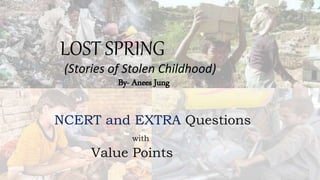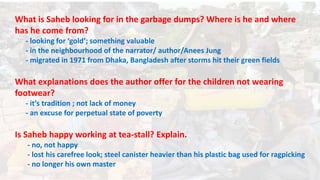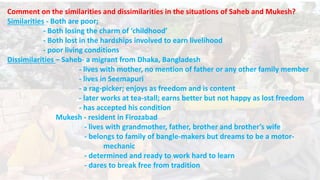QuesAns of Lost Spring by Anees Jung
- 1. LOST SPRING (Stories of Stolen Childhood) By- Anees Jung NCERT and EXTRA Questions with Value Points
- 2. RECAP PART-1 (ŌĆśSometimes I find a Rupee in the GarbageŌĆÖ) - Story of Saheb (Saheb-e-Alam) - Irony in name as the name means Lord of the Universe; but he is a ragpicker - Lives in Seemapuri; place on the periphery of Delhi but completely in contrast - Ragpicking is a means of survival for adults but for children it is wrapped in wonder - Enjoys watching the game of tennis but the game is out of reach - The gatekeeper of club sometimes allows him to use swings ŌĆō sympathises ŌĆō understands his conditition and desire as himself not rich - Saheb works at a tea-stall; earns 800 rupees and all meals - Lost carefree look; steel canister heavier than plastic bag - Not happy; no longer his own master
- 3. RECAP PART-2 (ŌĆśI want to Drive a CarŌĆÖ) - Story of Mukesh - Son of a bangle maker in Firozabad - Firozabad ŌĆō centre of glass-blowing industry ŌĆō popular for bangles - Bangle making done for generations - considered as a karam (destiny); God-given lineage- canŌĆÖt be broken - Hazardous working conditions- dingy cells without air and light, furnaces with high temperature, lose eyesight at young age, dust from polishing bangles harmful to eyes -Living conditions- bad, stinking lanes, crumbling walls, wobbly doors, no windows, humans and animals coexisting - No one there dares to dream but Mukesh wants to be motor mechanic - Determined; ready to walk to far off garage to get training - TWO distinct worlds- world of Rich VS world of Poor - World beyond unapproachable ŌĆō Few planes fly over Firozabad
- 5. What is Saheb looking for in the garbage dumps? Where is he and where has he come from? - looking for ŌĆśgoldŌĆÖ; something valuable - in the neighbourhood of the narrator/ author/Anees Jung - migrated in 1971 from Dhaka, Bangladesh after storms hit their green fields What explanations does the author offer for the children not wearing footwear? - itŌĆÖs tradition ; not lack of money - an excuse for perpetual state of poverty Is Saheb happy working at tea-stall? Explain. - no, not happy - lost his carefree look; steel canister heavier than his plastic bag used for ragpicking - no longer his own master
- 6. What makes the city of Firozabad famous? - famous for bangles ; centre of glass blowing industry - all families into bangle making Mention the hazards of working in the glass bangles industry. - dingy cells without air and light; close to glass furnaces with high temperatures - Lose eyesight at very young age - dust from polishing glass bangles can make them blind How is MukeshŌĆÖs attitude to his situation different from that of his family? - family considers bangle making as a god-given lineage ŌĆō can not break it - father himself a bangle-maker; taught his sons the same - Mukesh different- wants to be a motor mechanic- ready to go to far-away garage and learn
- 7. What could be some of the reasons for the migration of people from villages to cities? - major reason for migration is survival - lands and fields in villages destroyed due to a natural calamity/ disaster ( as in case of Saheb) - poverty- no employment/ no food/poor living conditions - for improvement Would you agree that promises made to poor children are rarely kept? Why do you think this happens in the incidents narrated in the text? - Yes; promises made to poor are rarely kept ŌĆō poor never in position to question them - Narrator made a false promise (half-jokingly) to Saheb about starting a school - Promises made to improve their living conditions never fulfilled (lived in Seemapuri for over 30 years but no identity- ration cards to get their names on votersŌĆÖ lists) - Child Labour Law flouted ŌĆō children working in bangle making factory - Rich, powerful people donŌĆÖt empathise and never helping poor - Poor never courageous enough to oppose (as in FirozabadŌĆÖs case- no one dared to dream); For them fighting means empty stomach
- 8. What forces conspire to keep the workers in the bangle industry at Firozabad in poverty? - For generations into bangle-making - Illiterate; donŌĆÖt have any other skill; no alternate source of earning - consider this as their destiny; God-given lineage- therefore can not deviate - World of sahukars, policemen, middlemen impose this burden - Do not dare to oppose and to dream of any other occupation How, in your opinion, can Mukesh realise his dream? - A bangle-maker; ready to break the familyŌĆÖs traditional occupation, i.e. bangle making - Dares to dream; to be a motor-mechanic - Difficulties in fulfilling dream - garage far away, no knowledge of motors, no money for transportation - Qualities to overcome difficulties- determined to walk up-down the distance to garage, ready to learn; may achieve with his hard work, patience, firm will/ determination
- 9. Why should child labour be eliminated and how? - Examples of child labour- bangle making industry, carpet industry, cracker factory, domestic servants, dish-washers at road-side dhabas, etc. - Burdened with responsibilities of work ŌĆō lose childhood very soon (stolen childhood)ŌĆō no spring season in their life ŌĆō no charm or dreams - Malnourished, ill-fed, unhealthy, diseased, stunted growth - No education ŌĆō poor ŌĆō chances to improve the condition are bleak ŌĆō future dark - Condition can be improved - with the help of government and non- government agencies - stricter laws and their implementation - awareness and education - rehabilitation of workless children ŌĆō need to be provided with food, shelter and security - given equal opportunities to enjoy life
- 10. Carefully read the given phrases and sentences from the text and identify their literary device. 1. Saheb-e-Alam which means the lord of the universe is directly in contrast to what Saheb is in reality. ŌĆō Hyperbole, Irony 2. Drowned in an air of desolation.- Metaphor 3. Seemapuri, a place on the periphery of Delhi yet miles away from it, metaphorically. - Contrast 4. For the children it is wrapped in wonder; for the elders it is a means of survival.- Contrast 5. As her hands move mechanically like the tongs of a machine, I wonder if she knows the sanctity of the bangles she helps make. - Simile 6. She still has bangles on her wrist, but not light in her eyes. - Contrast
- 11. 7. Few airplanes fly over Firozabad. - Hyperbole 8. Web of poverty.- Metaphor 9. Scrounging for gold.-Metaphor 10. And survival in Seemapuri means rag-picking. Through the years, it has acquired the proportions of a fine art. - Hyperbole 11. The steel canister seems heavier than the plastic bag he would carry so lightly over his shoulders.- Contrast 12. Garbage to them is gold. ŌĆō Hyperbole
- 12. EXTRA QUESTIONS Reference to Context Type Questions with Value-Points
- 13. He does not know what it means. If he knew its meaning ŌĆö lord of the universe ŌĆö he would have a hard time believing it. Who is he ? What is his complete name ? Saheb; Saheb-e-Alam What does his name mean? Lord of the universe Why would he have difficulty in believing the meaning of his name ? Irony- not the lord of universe but a rag-picker I wonder if this is only an excuse to explain away a perpetual state of poverty. Who is ŌĆśIŌĆÖ here? Narrator/ author/ Anees Jung What does ŌĆśthisŌĆÖ refer to in the given line? Tradition of being barefoot, not wearing chappals Mention the other reasons give for hiding state of poverty? Mother didnŌĆÖt get them down from the shelf, wanted shoes
- 14. Children grow up in them, becoming partners in survival. Who are the children here? Saheb and other rag-pickers What does ŌĆśthemŌĆÖ refer to in the given line? Mud hutments in Seemapuri With whom are the children partner? Parents/ adults residing in Seemapuri How are they partners in survival?/What do these children do ? Rag-pickers like adults, help in earning to survive
- 15. The steel canister seems heavier than the plastic bag he would carry so lightly over his shoulder. Who does ŌĆśheŌĆÖ refer to? Saheb/ Saheb-e-Alam Where does work now? At a tea stall How much does he get in return of his work? 800 rupees and all meals Is he happy? Give reason. No; no longer his own master, has to follow tea-stall ownerŌĆÖs orders Which plastic bag is being referred here? Plastic bag used for rag-picking
- 16. ŌĆ£I will learn to drive a car,ŌĆØ he answers, looking straight into my eyes. His dream looms like a mirage amidst the dust of streets that fill his town. Who does ŌĆśIŌĆÖ refer to? Mukesh, son of a bangle maker What is his dream? To be a motor mechanic, to learn to drive a car Name the poetic device used inŌĆÖ his dream looms like a mirageŌĆÖ. Simile Why is his dream like a mirage? Unreal because of his poor conditions Which town does he live in? Firozabad What is the town famous for? Making bangles as it is the centre of glass-blowing industry
- 17. ŌĆ£Can a god-given lineage ever be broken?ŌĆØ she implies. Who is the speaker? MukeshŌĆÖs grandmother Which lineage is she talking about? Working as a bangle-maker, from generation to generation Why can it not be broken? Poverty and lack of education and courage do not let them fight and break free ŌĆ£Little has moved with timeŌĆØ Where has little moved with time? In Firozabad Why has little moved? Living and working conditions have not changed for years Who have been responsible for this little movement? The world of rich, powerful people; by not letting the poverty stricken people raise their voice
- 18. ŌĆ£Listening to them, I see two distinct worlds.ŌĆØ Who is the speaker? Author/ narrator/ Anees Jung Who does ŌĆśthemŌĆÖ refer to? Bangle-makers in Firozabad What has the speaker listened to earlier? Poor living, working conditions of bangle-makers; exploitation by rich and powerful people Which two worlds does the speaker talk about? The world of poverty-stricken bangle-makers who are exploited and the world of rich , powerful people like money-lenders (sahukars), middlemen, policemen, bureaucrats, politicians etc. who exploit the poor for their greed
- 19. Short Answer Type Questions (30-40 words) with Value-Points
- 20. Why has Saheb and his family left their home in Bangladesh? - Storms and floods destroyed fields - Poverty-stricken; with no food available Explain ŌĆśpromises like mine abound in every corner in this bleak world.ŌĆÖ - Empty promises made to poor - Author made similar promise of opening school, but no school to be there Explain the irony in SahebŌĆÖs name. - Saheb-e-Alam means Lord of the Universe - But, he lives in poverty, is barefoot and rag-picking Describe Seemapuri. - Area in periphery of Delhi - Refugees from Bangladesh live - Mud huts with tin and tarpaulin roofs, no drainage/ sewage system, no running water or school for children
- 21. ŌĆśGarbage to them is gold.ŌĆÖ Why does the author say so about the ragpickers? - Find something valuable which can get them money - Find a silver coin or a ten-rupee note in garbage Is Saheb happy in working at a tea-stall? How do you know? - Not happy - Lost his carefree look; no longer his own master Mention two problems faced by bangle-makers. - Hazardous working conditions ŌĆō lose eyesight - Poverty keeps them continue being bangle-makers and not come out of the vicious circle Describe the vicious circle bangle-makers are in. - Poverty stricken ŌĆō work as bangle-makers ŌĆō exploited by middlemen, sahukars, policemen ŌĆō unable to raise voice against exploitation and greed ŌĆō remain poor bangle-makers
- 22. How is Mukesh different from his family and other bangle makers? - Dares to dream - Wants to be a motor mechanic and not continue to be a bangle-maker Why can bangle-makers not organize themselves into a cooperative? - Trapped in vicious circle of poverty - Suppressed by rich, powerful people like sahukars, policemen, middleman, etc. - Are beaten up if are courageous to raise voice ŌĆśSurvival in Seemapuri means rag-picking.ŌĆÖ Comment. - Ragpickers live there; poor - Rely on rag-picking- both adults and children work What did the garbage mean to the children of Seemapuri and to their parents? - For children- wrapped in wonder- sometimes find coin or currency note in garbage - For adults- means of survival- items to be sold for cash
- 23. Long Answer Type Questions (120-150 words) with Value-Points
- 24. Comment on the similarities and dissimilarities in the situations of Saheb and Mukesh? Similarities - Both are poor; - Both losing the charm of ŌĆśchildhoodŌĆÖ - Both lost in the hardships involved to earn livelihood - poor living conditions Dissimilarities ŌĆō Saheb- a migrant from Dhaka, Bangladesh - lives with mother, no mention of father or any other family member - lives in Seemapuri - a rag-picker; enjoys as freedom and is content - later works at tea-stall; earns better but not happy as lost freedom - has accepted his condition Mukesh - resident in Firozabad - lives with grandmother, father, brother and brotherŌĆÖs wife - belongs to family of bangle-makers but dreams to be a motor- mechanic - determined and ready to work hard to learn - dares to break free from tradition
- 25. Describe the life of rag-pickers in Seemapuri. ŌĆó Poverty stricken ŌĆó Migrants from Bangladesh in 1971 ŌĆó Poor living conditions- live in mud hutments with tin or tarpaulin roofs, devoid of sewage, drainage or running water ŌĆó No identity even after living for decades ŌĆó Contended to have ration cards- able to get food which was lacking in their native place ŌĆó No school ŌĆó Children work along with adults- partners in survival ŌĆó Work as rag-pickers- though meaning different for children and adults- for children, it is wrapped in wonder ŌĆō for adults ŌĆō means of survival
- 26. What kind of life do bangle-makers lead? What forces them to continue living in those conditions? ŌĆó Bangle-makers of Firozabad, poverty stricken ŌĆó Hazardous working condition- high temperatures, dingy cells with no air and light, harmful to eyes and lungs, lose eyesight at young age, while polishing bangles dust damages eyesight, no joy felt ŌĆó Poor living conditions ŌĆō stinking lanes, live in shacks- half built houses, thatched roofs, wobbly (unsteady doors), no windows, houses cramped with humans and animals coexisting ŌĆó Forced to continue as bangle-makers, unable to break free from the old tradition, do not dare to dream, do not dare to organize and fight ŌĆó Suppressed by sahukars (money-lenders), middlemen, policemen, politicians, etc. ŌĆó If raise voice against exploitation, get beaten up ŌĆó Remain in vicious circle and continue struggling

























